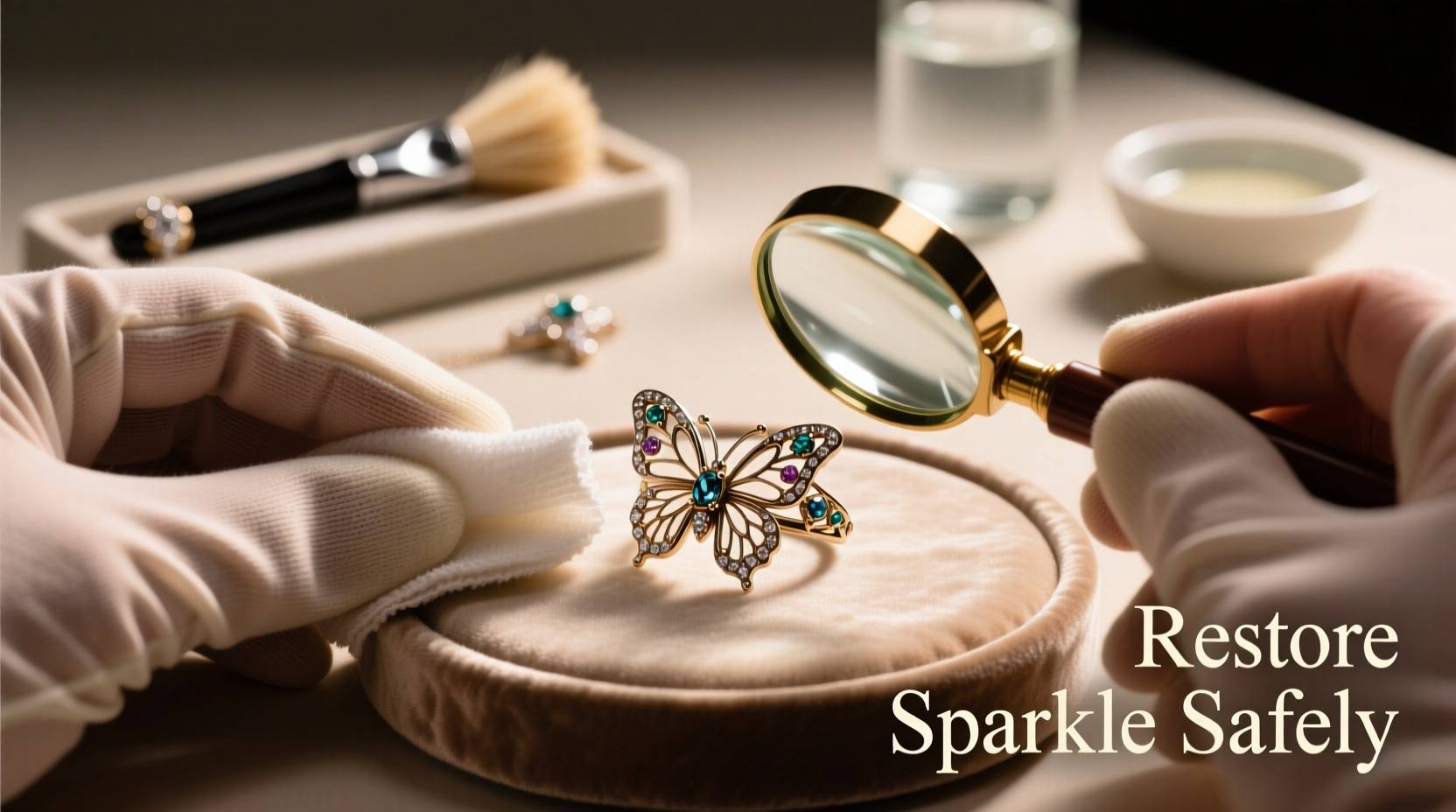A butterfly ring is more than just jewelry—it’s a symbol of transformation, elegance, and personal expression. Whether it's a family heirloom, a gift, or a treat for yourself, its intricate design and delicate details deserve proper care. Over time, exposure to daily elements like lotions, sweat, and dust can dull its brilliance. But with the right techniques, you can bring back its original sparkle without risking damage. This guide provides a comprehensive, expert-backed approach to cleaning, maintaining, and preserving your butterfly ring for years to come.
Understanding Your Butterfly Ring’s Materials

Before attempting any restoration, it’s essential to identify what your ring is made of. Most butterfly rings are crafted from precious metals like sterling silver, white gold, yellow gold, or platinum, often adorned with gemstones such as cubic zirconia, sapphires, or diamonds. The wings may feature enamel detailing, micro-pavé stones, or filigree metalwork—all of which react differently to cleaning agents and methods.
For example, silver tarnishes easily due to sulfur in the air, while porous stones like opals can crack if exposed to harsh chemicals. Enamel coatings are especially vulnerable to abrasion. Knowing your ring’s composition ensures you choose a safe and effective cleaning method.
“Many people assume all jewelry can be cleaned the same way. That’s a dangerous misconception—especially for detailed pieces like butterfly rings.” — Lena Torres, Master Jewelry Conservator at Heritage Jewel Restoration
Step-by-Step Guide to Safe Cleaning
Cleaning your butterfly ring at home can yield excellent results when done correctly. Follow this step-by-step process tailored for delicate, ornate designs:
- Inspect the ring closely. Use a magnifying glass or jeweler’s loupe to check for loose stones, cracks, or worn prongs. If anything appears unstable, skip cleaning and consult a professional.
- Prepare a gentle cleaning solution. Mix one tablespoon of mild dish soap (phosphate-free) with one cup of warm distilled water. Avoid soaps with moisturizers, dyes, or degreasers.
- Soak the ring for 15–20 minutes. Place it in a small bowl with the solution. This loosens dirt trapped in crevices without aggressive scrubbing.
- Clean with a soft-bristled brush. Use a clean toothbrush with ultra-soft bristles to gently brush around stone settings, under wings, and along engraved areas. Never press hard.
- Rinse thoroughly. Hold the ring under lukewarm running water to remove all soap residue. Be sure the drain is closed or use a strainer.
- Dry with a lint-free cloth. Pat dry gently—do not rub. Allow to air-dry completely before wearing or storing.
Do’s and Don’ts: Protecting Delicate Details
Butterfly rings are artistic by nature, often featuring fine wire work, textured surfaces, and colorful accents. A misstep during cleaning can lead to irreversible damage. Refer to this table for best practices:
| Do’s | Don’ts |
|---|---|
| Use a soft microfiber cloth for polishing | Use paper towels or tissues—they’re abrasive |
| Clean every 2–3 weeks with mild soap | Soak for more than 30 minutes—can weaken adhesives |
| Store flat in a fabric-lined box | Stack with other jewelry—can scratch enamel |
| Take to a jeweler annually for inspection | Use ultrasonic cleaners on rings with enamel or pearls |
| Wipe after each wear with a dry cloth | Expose to chlorine, saltwater, or bleach |
Real Example: Restoring a Vintage Silver Butterfly Ring
Sophie inherited a 1940s sterling silver butterfly ring from her grandmother. Though beautiful, it had darkened significantly, and the blue enamel on the wings was cloudy. She avoided commercial silver dips, knowing they strip patina and risk damaging enamel.
Instead, she followed the gentle soap-and-water method, soaking the ring for 15 minutes and using a baby’s nail brush to reach beneath the wings. After drying, she noticed improved luster but still some cloudiness. She then took it to a local jeweler who used a non-abrasive rotary tool with a felt tip to carefully polish only the metal, avoiding the enamel entirely. The result? A radiant restoration that preserved the ring’s vintage charm.
This case underscores the importance of patience and selective treatment—especially when dealing with mixed materials.
When to Seek Professional Help
While at-home care maintains daily shine, professional restoration is necessary in certain cases:
- The center stone is wobbly or partially dislodged
- There are visible scratches on the metal surface
- The ring has deep-set grime in hard-to-reach areas
- You're unsure of the materials used in construction
Jewelers have access to steam cleaners, precision tools, and expertise in handling fragile components. They can also re-plate rhodium on white gold or repair broken wing filigree. Scheduling an annual inspection helps catch issues early.
Frequently Asked Questions
Can I use baking soda to clean my butterfly ring?
Baking soda is mildly abrasive and can scratch soft metals like silver or gold, especially on detailed surfaces. While occasionally used for heavy tarnish, it’s not recommended for regular cleaning of ornate rings. Stick to mild dish soap for consistent care.
How often should I clean my butterfly ring?
Light cleaning every two to three weeks is ideal for regular wear. Wipe it with a dry, soft cloth after each use to minimize buildup. Deep cleaning once a month is sufficient unless exposed to lotions, sweat, or environmental pollutants frequently.
Is it safe to wear my butterfly ring in the shower?
No. Water, especially chlorinated or hard water, can erode metal finishes and loosen stone settings over time. Soap scum also builds up in crevices, making the ring appear dull. Always remove your ring before bathing or swimming.
Essential Care Checklist
Stay proactive with this simple checklist to keep your butterfly ring sparkling:
- ☑ Inspect for loose stones weekly
- ☑ Clean with mild soap and water every 2–3 weeks
- ☑ Dry thoroughly with a lint-free cloth
- ☑ Store separately in a padded jewelry box
- ☑ Remove before household chores, swimming, or applying cosmetics
- ☑ Schedule a professional inspection annually
Conclusion: Preserve Beauty with Intentional Care
Your butterfly ring carries meaning, memory, and artistry. Its sparkle isn’t just about appearance—it reflects the attention and respect you give to something precious. By understanding its materials, following safe cleaning practices, and knowing when to seek expert help, you ensure it remains a radiant part of your story for decades.









 浙公网安备
33010002000092号
浙公网安备
33010002000092号 浙B2-20120091-4
浙B2-20120091-4
Comments
No comments yet. Why don't you start the discussion?